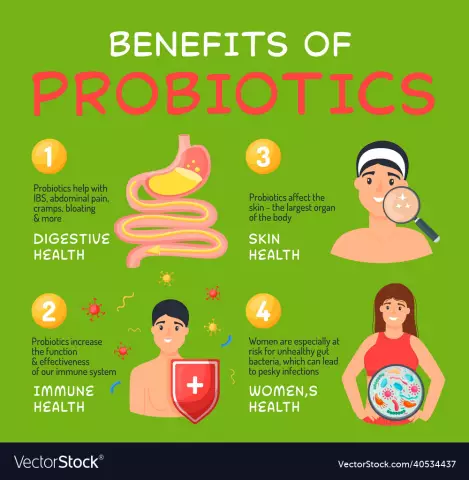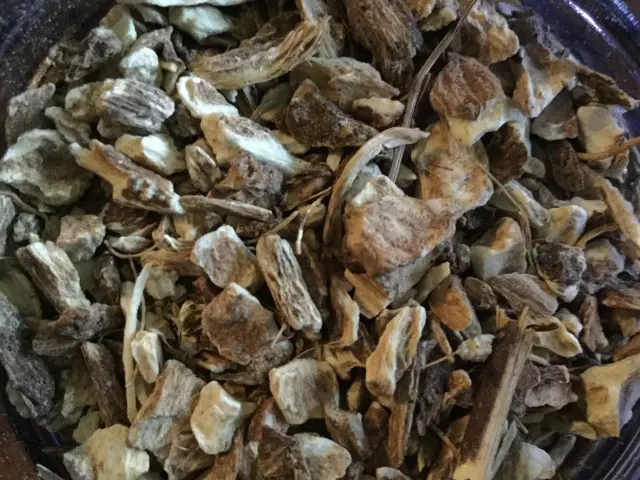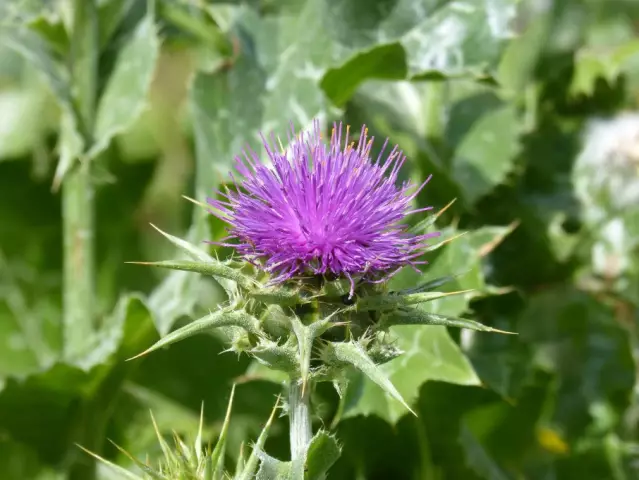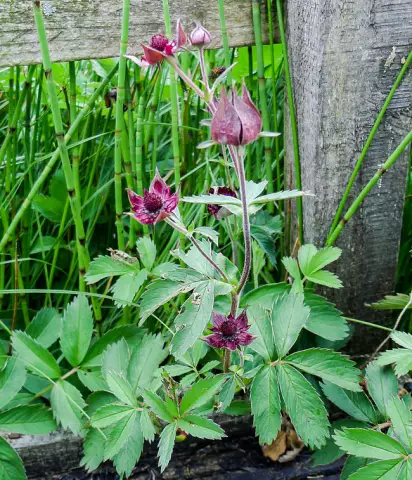- Author Rachel Wainwright wainwright@abchealthonline.com.
- Public 2023-12-15 07:39.
- Last modified 2025-11-02 20:14.
Altai elixir
Altai elixir: instructions for use and reviews
- 1. Release form and composition
- 2. Pharmacological properties
- 3. Indications for use
- 4. Contraindications
- 5. Method of application and dosage
- 6. Side effects
- 7. Overdose
- 8. Special instructions
- 9. Application during pregnancy and lactation
- 10. Use in childhood
- 11. In case of impaired renal function
- 12. Drug interactions
- 13. Analogs
- 14. Terms and conditions of storage
- 15. Terms of dispensing from pharmacies
- 16. Reviews
- 17. Price in pharmacies
Latin name: Elixir Altaysky
ATX code: A13A
Active ingredient: aqueous-alcoholic extract of 24 components of plant materials
Manufacturer: CJSC FP MELIGEN (Russia); Lumi LLC (Russia)
Description and photo update: 2019-10-07
Prices in pharmacies: from 86 rubles.
Buy

Altai Elixir is a general tonic combined herbal remedy.
Release form and composition
The drug is released in the form of an elixir: a brown liquid with a specific odor, during storage, sediment formation is allowed (100, 200 or 250 ml in a bottle made of dark or discolored glass / polymer bottle; 1 bottle / bottle in a cardboard box, on which instructions are applied on the use of the Altai elixir).
1000 ml of elixir contains:
- active ingredients: hydroalcoholic extract "Altai", which includes 24 plant components (rhizomes and roots of Rhodiola rosea, lingonberry leaves, Siberian cedar pine seeds, badan rhizomes, rose hips, oregano herb, chamomile flowers, licorice roots, bird cherry fruits, bearberry leaves, flowers and fruits of hawthorn, herb St. John's wort, rhizomes and roots of Eleutherococcus, sage leaves, herb yarrow, leaves of plantain, fruits of black chokeberry, rhizomes with roots of Leuzea or raponticum safflower, herb wormwood, coriander fruits, rhizomes, cinquefoil, chaga by the roots of the evading peony) - 297.5 ml (the content of the sum of flavonoids in terms of rutin is 200 mg / l);
- additional substances: natural honey, apple juice, ethanol 95%, elixir color, purified water.
Pharmacological properties
Pharmacodynamics
Altai elixir is a herbal remedy that has a tonic and tonic effectiveness, increases immunity and helps to normalize metabolic processes.
The therapeutic effect is due to the beneficial properties of the plant components included in the Altai elixir:
- Rhodiola rosea rhizome: has a stimulating effect on the central nervous system (CNS); participates in the regulation of the work of the vegetative-vascular system and rehabilitation after infectious lesions, demonstrates antiviral effect, increases efficiency and stress resistance;
- lingonberry leaves: due to their diuretic and antiseptic effect, they are effective in diseases of the genitourinary system; contain ascorbic acid (vitamin C) and B vitamins;
- Siberian cedar seeds: help purify the blood, reduce weight in case of excessive indicators; include 19 amino acids, iron, zinc, iodine, silver, copper, manganese, phosphorus; ascorbic acid contained in the herbal remedy promotes metabolic processes, magnesium - reduces the excitability of the nervous system and normalizes cholesterol metabolism;
- chamomile flowers: have anti-inflammatory, sedative and mild anesthetic effects, as well as antiallergic effect, participate in the correction of reflex functions and enhance brain activity;
- badan rhizome: used as an antiseptic and antimicrobial agent for urinary tract lesions and oncological diseases; the plant has a hemostatic effect, strengthens the vascular walls, helps to reduce blood pressure (BP); contains amino acids, tannins, tannins, arbutin;
- rose hips: have tonic and stimulating properties; help to restore damaged cells, improve the metabolism of carbohydrates and minerals, strengthen the walls of blood vessels; show a choleretic effect, normalize hematopoietic function and increase efficiency; include tannins, vitamins C, K and P, pectins;
- licorice root: enhances glandular secretion; is a source of organic acids, glucose, sugars, fructose, tannins, ascorbic acid, carotene, resins; the saponins contained in the plant provide an enveloping and expectorant effect; reduces testosterone production, participates in the regulation of hormonal levels; demonstrates a diuretic and laxative effect;
- hawthorn flowers and fruits: in the form of an alcoholic tincture, the flowers of the plant are used to relieve the excitability of the heart muscle and regulate blood circulation in the vessels of the brain; fruits are rich in vitamins, and also include amino acids, choline, tannins, pectin; it is prescribed for neurotic conditions, as a blood purifier and for the relief of manifestations of climacteric syndrome;
- St. John's wort herb: has an antiseptic and astringent effect in case of gastric ulcers, gastritis, colitis, diseases of the gallbladder; a source of vitamin C, saponins, essential oils, tannins;
- bird cherry fruits: have anti-inflammatory, astringent and fixing effect, normalize the functions of the digestive tract, help to strengthen the immune system, increase the elasticity of the walls of blood vessels;
- bearberry leaves: produce a diuretic effect in kidney disease; due to the content of tannins, they are recommended for the treatment of gastrointestinal diseases; have anti-inflammatory and analgesic effects;
- eleutherococcus rhizomes and roots: provide a general tonic effect, increase efficiency, reduce irritability, contribute to the adaptation of the body to aggressive environmental conditions; contain a complex of vitamins, valuable organic compounds of glycosides, resins, pectin substances; prescribed for overwork, neurasthenia;
- oregano herb: helps to strengthen the immune system, is useful in the treatment of insomnia, nervous disorders, stomach cramps, has a choleretic effect; contains vitamin C, tannins, essential oils; used against the background of hypertension, atherosclerosis;
- Yarrow herb: used for gastric disorders, bleeding of any genesis, urinary tract lesions, liver diseases, for blood purification; contains organic acids, vitamin C, fatty oils, tannins, choline and carotene;
- raponticum safflower rhizome with roots: enhance the adaptogenic capabilities of the organism; preparations based on the plant activate mental abilities, increase physical activity, improve the condition in the postoperative period, increase potency;
- coriander fruits: help to increase appetite, eliminate pain, are used as an antiseptic and anthelmintic; contain essential oils (up to 80%), tannins, fatty oils, vitamin C, alkaloids, pectin;
- sage leaves: have anti-inflammatory, antiseptic and hemostatic effect, have a positive effect on the nervous system; rich in flavonoids, essential oils, fatty acids, tannins, alkaloids; recommended for the treatment of stomatitis, respiratory diseases, flatulence, colitis;
- Potentilla rhizomes: exhibit astringent, anti-inflammatory and bactericidal properties; help to stop bleeding, used for the treatment of skin diseases;
- peony roots: help to reduce headaches, produce a sedative effect, are used for sleep disorders, neuroses, depression;
- wormwood bitter herb: demonstrates wound healing and analgesic effects; includes a large amount of bitter glycosides, organic acids, flavonoids, tannins, saponins; prescribed for anemia, indigestion, dyspepsia, hepatitis;
- plantain leaves: contain a large amount of bitter substances, mucus, and ascorbic acid; useful for relieving pain and relieving inflammation, used for allergies, stomach diseases, inflammatory lesions of the bladder;
- chaga: demonstrates powerful immunostimulating properties, contains a large amount of manganese; plant-based preparations help to improve the state of cancer, participate in the stimulation of the autonomic nervous system;
- chokeberry fruit: rich in tannins and pectin, also contain sugars, carotene, sorbitol, vitamins C, E and group B, PP, trace elements; used as a tonic and vitamin remedy, as well as in the treatment of hypertension, scarlet fever, measles, rheumatism.
Indications for use
- mental and physical stress;
- asthenic conditions;
- the period of convalescence after serious illnesses, infectious and inflammatory;
- postoperative period.
Contraindications
Absolute:
- sleep disorder;
- arterial hypertension;
- acute cardiovascular and renal failure;
- convulsive states, epilepsy;
- acute infectious diseases;
- age up to 18 years;
- pregnancy and lactation;
- hypersensitivity to any component in the Altai elixir.
The product should be used with caution by persons suffering from diabetes mellitus.
Altai elixir, instructions for use: method and dosage
Phytopreparation Altai Elixir is taken orally 10-15 minutes before meals.
Recommended dosing regimen: 2 times a day, 10-15 ml (2-3 teaspoons) of the elixir, diluted in 100 ml (½ glass) of water or tea.
The course of therapy is 10 days. On the recommendation of a doctor, an increase in the duration of treatment and / or repeated courses are allowed.
Side effects
While taking the Altai elixir, such undesirable phenomena as headache, sleep disturbances, tachycardia, and allergic reactions may occur.
Overdose
At the moment, there is no information on overdose.
special instructions
It should be borne in mind that the product contains 37-40% ethyl alcohol.
To prevent sleep disorders, the Altai Elixir is not recommended for use in the afternoon.
Application during pregnancy and lactation
Treatment with a phytopreparation is contraindicated for pregnant and lactating women.
Pediatric use
The Altai elixir is contraindicated for persons under 18 years of age.
With impaired renal function
In the presence of renal failure, the Altai Elixir tonic should not be used.
Drug interactions
Interaction with other drugs / substances has not been identified.
Analogs
Analogues of the Altai elixir are Aralia tincture, Herbion Ginseng, Kedrovit, Gerimax Ginseng, Leuzei liquid extract, Doppelhertz Ginseng Active, Bittner's original large balm, Ginseng tincture, Schisandra seed tincture, Eleutherococcus liquid extract.
Terms and conditions of storage
Keep out of reach of children and protected from light, at a temperature of 15-25 ° C.
The shelf life is 3 years.
Terms of dispensing from pharmacies
Available without a prescription.
Reviews about the Altai elixir
Numerous reviews of the Altai elixir found on medical websites are mostly positive. Patients note that the drug, when taken as a course, gives strength and vigor, improves overall well-being, and increases efficiency. In addition, indicate the effectiveness of the herbal preparation when used as a prophylactic agent against colds and acute respiratory diseases (ARI), in some cases, note its hypotensive effect. According to many patients, the elixir should be taken only in the first half of the day, without exceeding the recommended dose.
The disadvantage of the Altai elixir in most cases is the presence of ethanol in its composition.
Price for Altai elixir in pharmacies
The price for the Altai elixir for 1 bottle / bottle can be: volume 100 ml - 90 rubles; volume 250 ml - 150 rubles.
Altai elixir: prices in online pharmacies
|
Drug name Price Pharmacy |
|
Altai elixir elixir 100 ml 1 pc. RUB 86 Buy |
|
Altai elixir elixir 100 ml 1 pc. 89 RUB Buy |
|
Altai elixir elixir 250 ml 1 pc. RUB 100 Buy |
|
Altai elixir bottle. 250ml 158 RUB Buy |

Anna Kozlova Medical journalist About the author
Education: Rostov State Medical University, specialty "General Medicine".
Information about the drug is generalized, provided for informational purposes only and does not replace the official instructions. Self-medication is hazardous to health!






